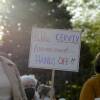Thousands gathered Saturday in Boston’s biggest pro-choice rally since the May 2 leak of a Supreme Court draft opinion that could reverse Roe v. Wade, the landmark decision that legalized abortion nationwide.
Abortion-rights defenders flooded the Boston Common to hold up signs, chant, and hear from advocates and politicians, including Sen. Ed Markey, D-Mass., and Attorney General Maura Healey.
Jessica Haber, 49, a doctor at Mass General Hospital, and Ingrid Katz, 51, a doctor at Brigham and Women’s Hospital, stood together in the crowd wearing white physicians’ coats, despite the blistering heat.
“We’re here wearing our white coats because, although I don’t provide abortions, many of my colleagues do, and they’re very isolated,” Haber told GBH News. “They’re feeling attacked by so many people who are not supportive of safe, effective reproductive health.
“One in four women has to deal with an abortion of some kind in their lives,” Haber said. “If this issue affected one in four men, we would not be where we are today.”
Erin Foster, 30, of Beacon Hill, said she is among the one in four. “Nobody plans to get an abortion, but those rights need to be there just in case, so I’ll never stop fighting.”
More Local News
If the court’s 1973 decision is reversed, advocates argue that it won’t reduce the number of abortions; instead, it will reduce the number of safe abortions. “I think back to stories that my grandmother told me about,” said Janelle Hales, a 26-year-old living in Brighton. “Like having to do the coat hanger abortions when she was growing up because women couldn’t legally get abortions back then either.”
Foster pointed out that overturning Roe v. Wade would have disparate impacts on people. “It will affect lower-income people of color the most. You have to take time off of work to get an abortion, you have to travel, gas is expensive, you have to have a place to stay. And if you’re in a state where you’re not close to a clinic, how far do you have to go?”
“We are very fortunate in Massachusetts,” said Haber, referring to the commonwealth’s laws that protect access to safe abortions. “I can’t even believe I’m saying this in 2022, but only the privileged can get access to essential health care. And that’s just wrong.”
Marnie Smith of Burlington expressed astonishment about the possibility of Roe’s reversal after 50 years. “In the late ‘60s and ‘70s, my sister, my mom, all of my mom’s friends were fighting [for the right to an abortion],” she said. “Here we go again.”
Smith said she fears that the ruling could threaten other rights previously upheld by the Supreme Court, such as same-sex marriage. “We absolutely thought that abortion rights were not going to be touched,” said Smith. “I think it’s naive to think that other rights are safe.”
Some attendees were veteran protesters who have attended other rallies, from March for Our Lives, Black Lives Matter, or the 2017 Women’s March. But 78-year-old Jane O’Leary of Jamaica Plain said the threat of losing safe abortion access pushed her to come out and demonstrate for the first time.
“This is not about being pro-abortion—it’s about being pro-choice,” said O’Leary, a member of the Catholic church. “Am I saying everyone should get an abortion? Of course not. I actually don’t believe in abortion, but I believe in choice.”
The rally on the Common was part of a nationwide series of “Bans Off Our Bodies” protests Saturday. There have been many smaller protests across the region since the draft ruling was revealed.
There did not appear to be any organized counter protest or anti-abortion activists present Saturday.
Kana Ruhalter is a GBH News intern.









